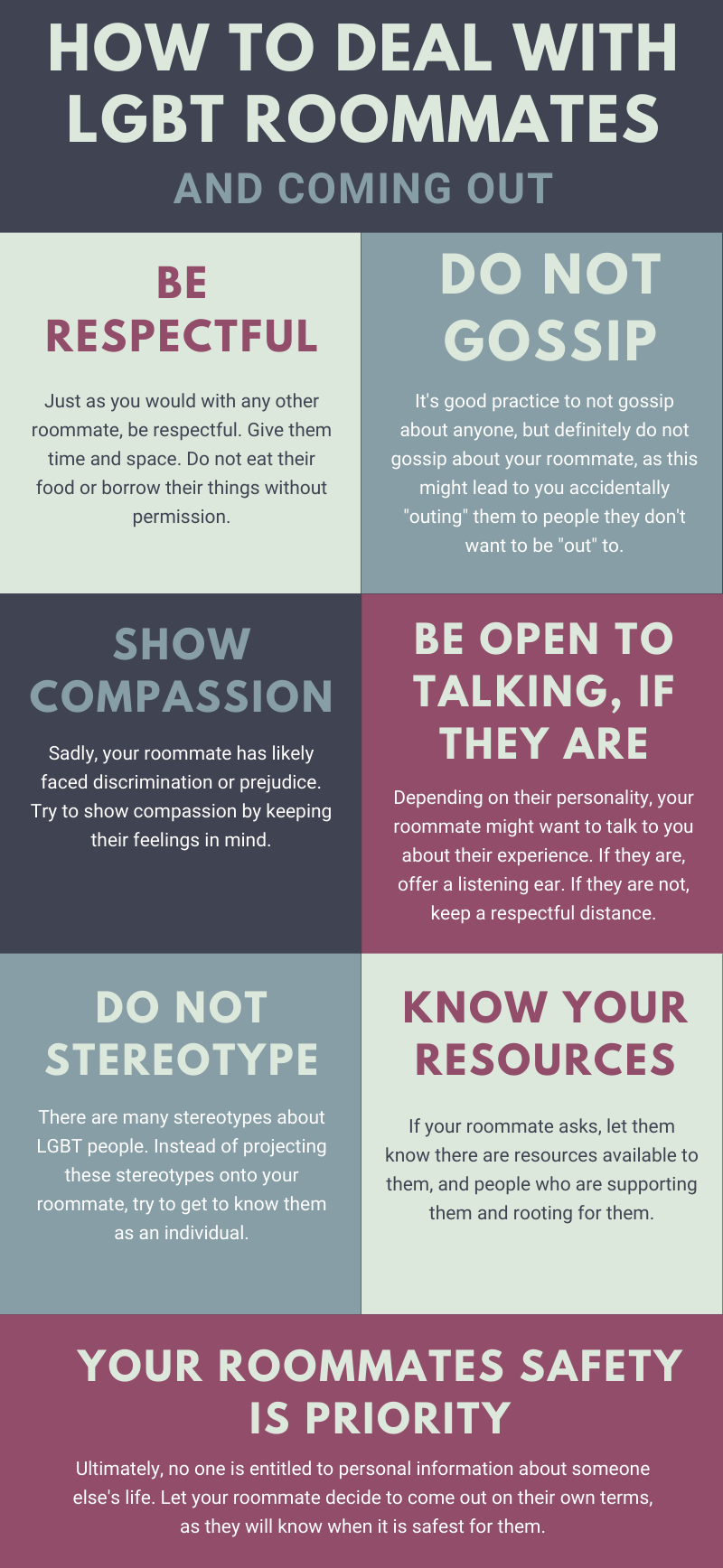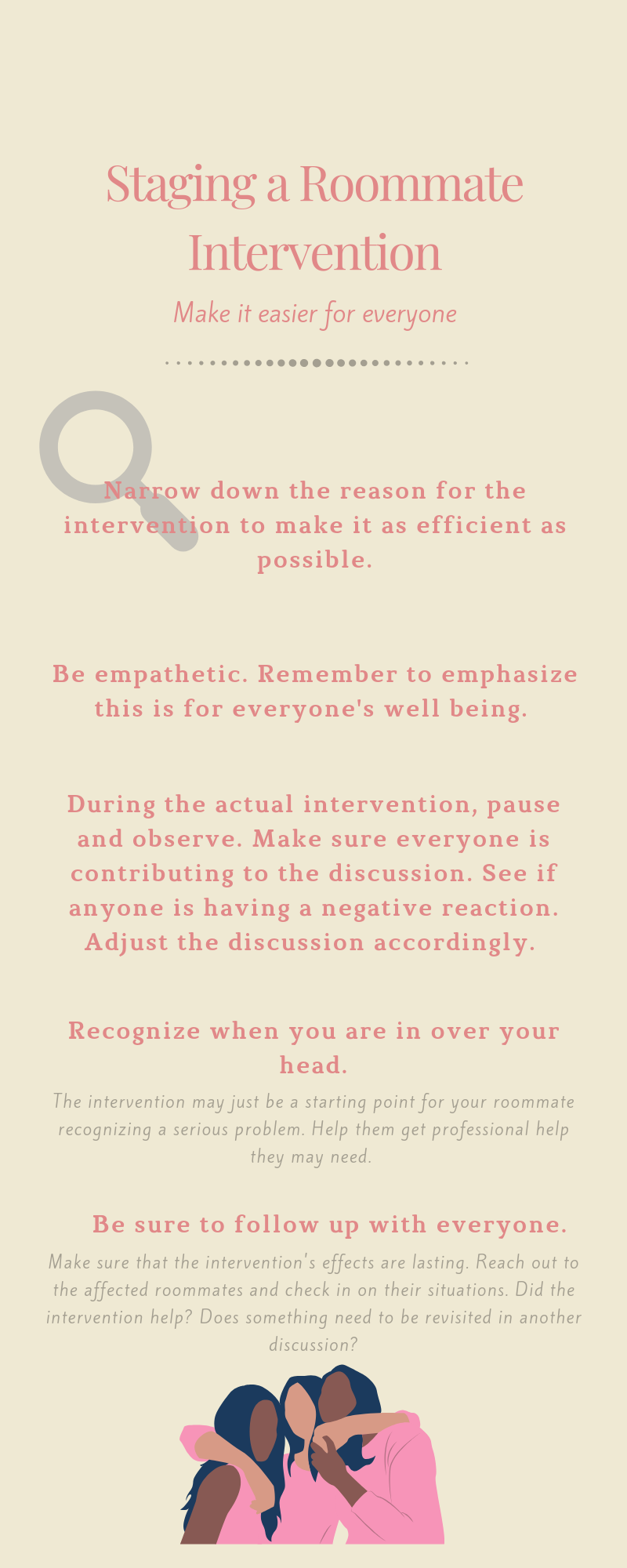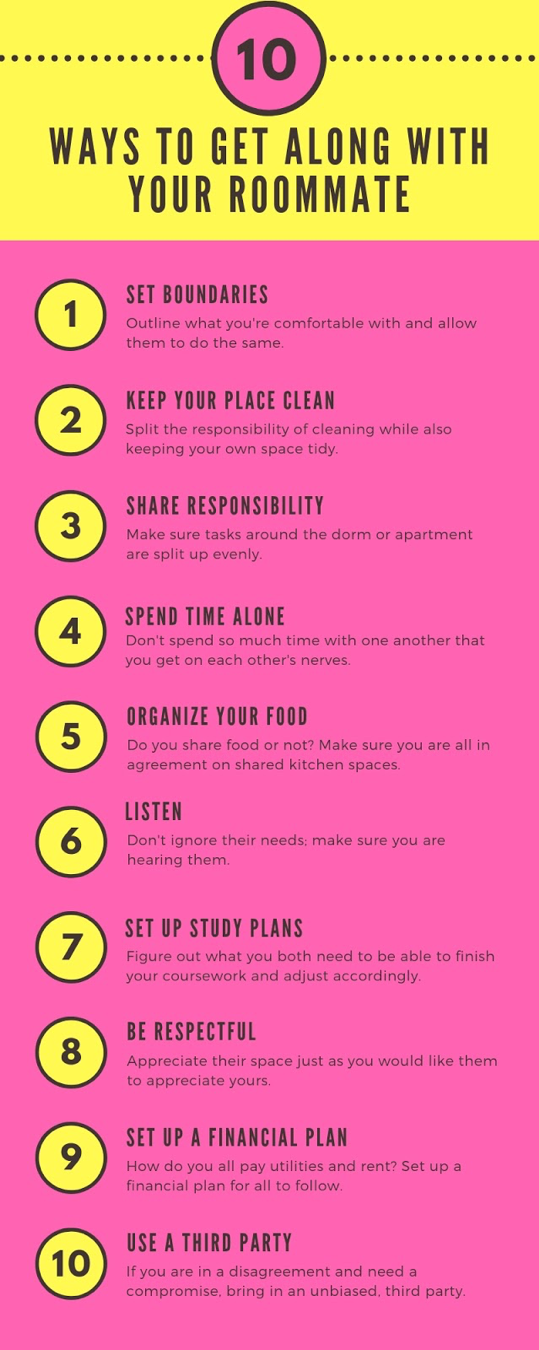College Roommate Tips
Tips on Eating Healthy and Cooking with Your Roommate
When you're in college, your health is often the last thing on your mind, especially when it comes to what you're eating. That's why the "freshman fifteen" is such a common saying - so many students start college and begin gaining weight. By the end of their freshman year, they're fifteen pounds heavier than they were when they graduated from high school.
Starting college brings on all kinds of stressors - including your classes, your social circle, and your eating habits. With limited cooking experience, many college freshmen end up snacking on junk food while pulling all-nighters, visiting the all-you-can-eat dining hall three times per day, and binge-eating in their dorm room on multiple occasions. These can all be contributing factors to gaining weight while you're in college -- which is rarely what any college freshman wants.
So as you continue on your college journey, remember that your eating habits directly impact your health. Maybe you're inclined to say, "I don't know how to cook," and maybe your cooking abilities include things like Ramen noodles and microwavable popcorn -- forget healthy. But there are definitely ways to learn how to cook healthier options, and as you progress through your college journey, you'll likely find yourself needing to create healthier options in your diet.

Living with roommates can definitely be tough. But one of the greatest parts of living with people is the community it gives you. And with communities come food. You probably aren't the only one looking for ways to eat healthier. It's likely that your roommates need healthier options, too. Here are some tips for you and your roommate to start eating (and cooking!) healthier.
1. Make a plan and hold each other accountable.
It might be hard to go "cold turkey" all at once. Instead, you might want to consider making a deal with your roommate to cook healthy 2-3 nights per week. You can slowly start increasing this plan, and eventually, you'll be eating healthy all the time. It's tough to go from eating out all the time to always cooking at home. Avoid setting yourself up for failure and set attainable goals. You'll be happier with yourself in the end.
2. Carve out time for grocery shopping and meal planning every week.
When you don't set aside time to grocery shop and plan your meals, you're setting yourself up for failure. If you're truly motivated to start eating healthier, make sure you are intentional about the planning it requires. Eating healthy meals you have to be disciplined. Don't allow yourself to run to the dining hall at 9pm, looking for the "feel good" foods.
3. Cook things you actually enjoy.
Don't force yourself to start liking avocados if you hate them. Try recipes that will challenge your tase buds without making you hate to eat. The reason we crave junk food is because it tastes delicious. Start allowing yourself to crave the healthy stuff.

4. Prep your meals ahead of time.
Avoid the last minute "I'm starving" phase of college by planning out your meals and prepping them ahead of time. When I was in college, I used to meal prep on Sunday afternoons. You and your roommate could easily spend some time making your meals for the week, so when it comes time to eat dinner or grab something between classes, you already have a plan. You'll be less likely to grab a bag of chips and a soda if you've already made a plan and prepped food for this specific scenario.
5. Don't even keep junk food in your living space.
If you don't have it available to you, you'll be less likely to snack on it. Instead, push yourself to only buy foods from the store that are healthy. Switch out your chips for easy snacking foods (like blueberries), and instead of keeping soda in your fridge, try vitamin waters. Maintaining healthy options at home is half the battle.
It's tough to eat healthy while you're in college - no one said it was easy! But you and your roommate can do it if you work together. Encourage each other. Spend time together. Plan and prep your meals with the goal of eating healthier in mind. Then you can always add in walking or biking to class, a nightly gym or yoga routine, and walks together on the weekends. Being healthy in college sounds like it'll come naturally, but you truly have to be disciplined about making yourself a plan.
How to Deal with LGBT Roommates and Coming Out
Starting college and living with a roommate, in and of itself, can be a shock to your system. You might experience an additional shock if you learn your new roommate is LGBT, especially if you have never lived with an LGBT person before. It’s not a bad thing, as it is a part of college that will help you meet people of different lifestyles, and cultures (isn’t that the point of college, anyway?). In this article, we will discuss how to deal with LGBT roommates. Toward the end of the article, we will discuss the flip side of the issue, coming out to your roommate.

Do not gossip about them
Just as it is not kind to gossip about anyone, it is not kind to gossip about your roommate. Do not talk badly about your roommate when they are not in the room. Most importantly, do not discuss your roommate’s personal life with others, as you do not want to “out” your roommate to someone they don’t want to be “outed” to. Your roommate’s personal life is not your information to be sharing with others. If you can’t help yourself from talking, avoid talking about them altogether. It’s better to do that than to “out” your roommate to someone they don’t know (or worse, to someone they know, but don’t want to be “out” to).
Again, gossiping about someone is wrong, whether they are LGBT or not. Please avoid gossiping about your roommate, especially about their personal life.
Do not be hostile toward them
Similarly, is not kind to be passive-aggressive or hostile to anyone, whether they are LGBT or not. Clearly, this applies to your roommate. After you find out they are LGBT, don’t suddenly start being mean to them or being cold to them. They will notice if you do, and they will quickly realize they don’t want to room with you anymore. Do not leave mean sticky notes on the mirror. Do not make snarky comments to them. Do not be a jerk! In other words, treat them kindly, just as you would any other person.
Do ask questions, if they seem open to it
This next point depends on your roommate. If they seem open to talking, ask them questions and try to get to know them better. No, these questions do not need to about their dating or sexual life. I would actually recommend that you refrain from asking those very personal questions as you are still getting to know your roommate since they might feel uncomfortable discussing personal matters with someone they don’t know. Instead, ask them about their favorite movies, music, or books. You could also ask them about the classes they’re taking, or about their family or hometown. When you ask your roommate these types of questions, you will quickly realize they are more like you than you think. Clearly, there is much more to your roommate than their sexuality, and these questions will help you see that. It could be the start of a great friendship.
On the other hand, you do not need to be close friends with your roommate. They are in no way obligated to be your “gay best friend”. If you try to ask them friendly questions and they don’t seem open to talking, don’t make them. Instead, as we will discuss in the next point, give them their space, as this is part of being a respectful roommate.
Do give them their space
Anyone who lives in a dorm likes to have the room to themselves for a little while. A good idea for any set of roommates is to give each roommate their own time and space in the room. You and your roommate will both be glad to have some quiet time in the room to study alone. This is a way of being respectful to your roommate and acknowledging that the space is just as much theirs as it is yours. This will definitely improve your roommate-to-roommate relationship. Of course, you should expect the same respect back. In other words, another way to show respect to your roommate, whether they are LGBT or not, is to give them their space.
Do show compassion toward them
As an LGBT person, it is likely your roommate has experienced discrimination or prejudice. Because of this, you should be compassionate toward them. Keep in mind that your roommate might feel insecure around certain people or places where they have had bad experiences. Try to put yourself in their shoes and to keep their feelings in mind. Being compassionate to your roommate will go a long way in your roommate-to-roommate relationship.
Do be respectful to them
Finally, a good way to summarize this entire article so far is to be respectful to your roommate, just as you would with any other person. You do not need to be best friends with your roommate, but you do need to respect their time and space. Of course, you should also respect their personal life by not talking to others about your roommate and by not asking invasive questions (hence, the first “don’t gossip” point). Don’t be mean or hostile! Be friendly to them, and ask them questions if they seem open to it. If you are respectful to your roommate, you can have a smooth roommate-to-roommate relationship even if your roommate is LGBT.
Do not stereotype them
Unfortunately, people have a very specific image of what an LGBT person is due to stereotypes (for example, that they are into fashion or going out to bars). If you do not know many LGBT people, you might be tempted to apply these stereotypes to your roommate. Don’t do this! Instead, remember that your roommate is an individual person with a unique personality and set of likes or dislikes. Even if they do happen to match some stereotypes, focus on getting to know your roommate instead of making inferences about them based on the stereotypes.
On the flip side, if you are the LGBT roommate:
Do not feel pressured to come out if the environment is unsafe
If you are the gay roommate, please do not feel pressured to come out. You do not owe anyone, not even your roommate, an explanation about something as personal as your sexuality. You decide to keep quiet, whether it be to anxiety and confusion, or even for your own safety. It’s your decision and yours alone. If you do decide to disclose your sexual orientation to your roommate, let it be because YOU want to and you feel safe doing so. You can also come out however you want to. You do not need to give your roommate a long speech, a simple reference to your preferences might do the trick if that’s what you want.
Come out to your roommate on your own terms, if at all!
If you decide to come out to your roommate, do it on your own terms. You could choose to come out to your roommate before you even meet, so you and your roommate can begin your time together knowing this information from the get-go. However, the catch is that you don’t know how your roommate will react because you don’t know them yet. It’s possible your roommate will have a positive reaction and that the roommate-to-roommate relationship will remain unaffected. It is also possible that your roommate will react badly to the news, and you will know to switch rooms as soon as possible! On the other hand, you can mention your preferences in passing once you and your roommate already know each other, so as to not make it a big deal (that is, of course, if you don’t want to make it a big deal. If you want to make it a big deal, you can!). The downside to coming out this way is that it might be awkward to drop big news like that once you have already known each other for a long time. These are simply some ideas, do whatever is best for you and your safety. Here are some indirect ways you can begin to determine if it is safe to come out to your roommate, and here some ways to come out to your roommate.
Additionally, if you decide to come out to your roommate, be aware that there might be a short adjustment period when your roommate gets used to the idea of having a LGBT roommate. For instance, they might need to get used to using different pronouns when addressing you. As long as they are still treating you with respect, please try to be patient with them. They will come around eventually. When they do, your friendship will be stronger, because they now know this personal information about you.
Remember that the room is just as much yours as it is theirs, and you have the right to feel comfortable in your own living space.
Don’t be afraid of your roommate’s questions
Of course, we have established that you are under no obligation to explain yourself or to answer anyone’s questions, especially about your personal life. However, your roommate will likely ask you questions once they find out you are LGBT. Questions might make you feel uncomfortable, like you are being interrogated or targeted. However, I want to encourage you to think about these questions in a different way. If your roommate is asking questions, it likely means they care and are trying to understand you better. If they did not care, they would not ask any questions. On the other hand, questions could mean your roommate is trying to accommodate you. This might be the first time they live with an LGBT person, so as long as they are respectful with their questions, try to be patient with them. This communication will help them realize that LGBT people are more similar to them than different. Although you don’t need to give an explanation to anyone, if your roommate is asking respectful questions, I would encourage you to be patient with them and answer their questions.

Seek out a community and resources
It is hard to do life alone, especially in college. For that reason, I would recommend that you seek out a community. Your community will be a source of support and encouragement for you. They will remind you that even though you might feel alone, you are not. There are many other college students going through the same thing you are. You will be able to offer your support to them, too. It will be a great way to make friends!
Similarly, I would encourage you to seek out resources. One place on your campus where you can find resources and a community is your school’s LGBT center. They will be able to connect you with people and places you can connect with. If you live in a dorm, another person who could point you to resources is your resident advisor (RA). This is the person you will go to about housing-related issues and questions, but I’m sure they will gladly point you in the direction of some helpful resources. When you have a community and resources, life at college will be much easier.
College involves many changes and new experiences. One of those new experiences could be rooming with an LGBT roommate. A good rule of thumb is to treat them the same way and give them the same respect, you would give to any other roommate. This means giving them space, not discussing their personal life behind their backs, being compassionate toward them, and being friendly to them. This will create a good roommate-to-roommate relationship, and your living experience will be more positive.
On the flip side of the coin, if you are the LGBT roommate, please do not feel forced to come out at all. If you do decide to, make sure it is safe and it is what you want. Finally, seek out a community and resources to help support you through your college experience.
In other words, treat each other with kindness and respect, and your roommate-to-roommate relationship should go smoothly.

Things To Consider When Taking a Weekend Trip With Your Roommate
College life can get stressful between classes, homework, work, and student organizations. Sometimes, it is good to get away for a few days, but it can be difficult to do during the week with so much going on. In this case, taking a weekend getaway is a great option. Even if you work weekends as well, you can request off so you can take care of your mental health. Going on a weekend getaway with your roommate is a great way to get to know each other off-campus while taking a much-needed and well-deserved break from campus life.
Figure out where you want to go
Deciding where you and your roommate want to go is the first hurdle. One of you might like a big city while the other wants to escape into nature. The best-case scenario is that you are alike in where you love going so that this decision is easy. Some factors that can go into where you go include the distance from campus, cost, and activities to do while there. Even if your campus is in a city, you may decide that you want to take a mini weekend getaway to a different part of the city. You may even decide to visit a different city. Another option is to go to somewhere surrounded by nature. If you or your roommate are from a town near campus, you can always go there. This is a great way for you and your roommate to get to know each other so that you can show each other where you grew up.
Establish a weekend when you will go
Since you and your roommate are in college, you have busy lives, especially with homework, work, and organizations. This makes it super difficult to plan a time where you are both available to escape campus for a weekend. When beginning to plan your trip, sit down and see what both of your schedules look like, either for the rest of the semester or the next semester. It may make sense to go after midterms or before breaks. Make sure you plan it far enough in advance so that you and your roommate can request off if needed.
Image via https://unsplash.com/photos/zVxq5S1jd5o
Decide how you will get there
If you or your roommate have a car on campus, driving is an option. Otherwise, you will have to find other options. Uber or Lyft may work if you are going somewhere close. If you live in a city, you may have access to various bus lines or trains to get to where you want to go. Airplanes are convenient, but they also tend to be expensive.
Once you get to where you want to go, make sure you know how you are getting back to campus. Also, make sure you have an idea of how you are getting around your destination, especially if you did not bring your own car. Walking or taking public transportation are your best options, but you can use ridesharing apps or taxis.
What to do, what to do…
Since you are only going away for the weekend, you have a limited amount of time. While you may be tempted to just wing it and see what you feel like doing when you get there, if you and your roommate have specific things that you want to do, you want to be sure you see everything. When you are planning, make a list of what you want to do while at your destination and have your roommate do the same. Once you are done, sit down and compare your lists. See what things your lists have in common and plan your trip accordingly.
When deciding what you want to do, do some research to see special things to do that are lesser-known to tourists. This will help make your trip even more memorable and you can help guide others to these places. Also, do not be afraid to do things that are out of your comfort zone. If you are afraid of heights, go up to an observation deck of a tall building. If you typically are a picky eater, try a new restaurant and new food that you never thought you would.
Money, money, money
While you may want to go all-out on your weekend trip, keep in mind that it is just a weekend and it is nothing to break the bank over. Also, remember that you are a student on a limited budget. There are plenty of websites and apps to help make sure you get the best deals on your travel, lodging, and activities. When making a list of things to do, look into free things. Even if you cannot do something for free, many activities, particularly museums, offer student discounts, so make sure you take advantage of this. Make sure both you and your roommate are paying for things equally so that everything stays fair.
Traveling with your roommate may seem impossible, but once you sit down and plan, you will be surprised at how everything falls into place.
Can You Change Roommates Living in a Dorm?
One of the biggest fears students have when moving into a dorm room for the first time is their roommate situation. Will they live with someone they like? Will they be miserable with a person they have nothing in common with? Social media has changed the game for many, but there are still the select few that encounter such issues.
This begs the question: can you change roommates when living in a dorm? The quick answer is yes, but the more accurate answer is that it depends on the situation. With that being said, below are six steps that you need to take when looking at changing your dorm room roommate.

1. Try to Reconcile
First and foremost, you are going to need to try and reconcile with your roommate before that option is entirely off the table. Reconciliation is the first step in fixing roommate issues, as switching roommates should always be a last resort.
Basically, if you think there is a chance that you and your roommate will be able to work things out, you will need to take that opportunity and ensure you reconcile with them.
2. Talk to Your RA
Assuming you’ve tried to reconcile and nothing came of it, you should then proceed with talking to your RA about the issues you and your roommate have been having with one another. While the two of you can certainly attempt to work things out on your own in the meantime, any serious issues should be brought to your RA’s attention as soon as possible.
Your RA is there to help you in situations such as this, so it’s important that you speak with them to work through these issues sooner rather than later, in an attempt to prevent them from developing further.
3. Bring Your Arguments to the Management Team
If speaking with your roommate and the RA doesn’t fix the problem, you should bring your arguments to the management team at your dorm room. There is a next step above your roommate, and that’s where you will need to go.
Again, this is a serious action and one that should only be taken if there is no other alternative for the two of you to work things out. Even so, the team may recommend you first speak with a mediator to work through the issues prior to any action in terms of moving the two of you.
4. Try a Mediator
To build off of the above point, a mediator is another great alternative to switching roommates. While you should immediately try to work through issues with your roommate, in some cases, you won’t be able to do so.
In those cases, you should try to speak to your roommate with a third party present (such as your RA) to help the both of you work through your issues. Just because you weren’t able to work through things on your own is not to say that you won’t be able to; it just means you may need more assistance in doing so.
5. Discuss Next Steps
Once all of the above steps have been taken and there is still no resolution in sight, then you should begin discussing next steps. It is at this point that switching a roommate is the next logical solution, but you should also know that both roommates will need to be on board.
When you’re thinking about switching roommates, it can be a time consuming and grueling process, so both of you will need to be sure it’s what you want, and the RA and management team will also need to be in agreement that it’s best for the both of you.
6. Wait for Further Instruction
Just because everyone is in agreement that you need to switch a roommate is not to say you will be immediately able to do so. For this reason, you’ll need to wait for further instruction when it comes to switching rooms.
For one, most residence halls will fill up by this point, so it may not be a possibility immediately and may require a change in the following semester when space opens up. The likelihood of a roommate change changes depending on your dorm’s policies, so when it comes down to it, you should have an open mind, as there is potential you will have to wait or that it may not happen at all.
Again, changing roommates can be a bit of a challenge, and one that many students aren’t quite prepared for. With that being said, the above six steps are a great way to get started in determining whether or not you and your roommate can continue living together for the remainder of the year, or if you will need to go your separate ways in order for both of you to be happy.
Either way, good luck to everyone and have a great semester!
Staging A Roommate Intervention

Unfortunately, roommate conflicts are all too familiar for college students. It’s nearly inevitable. With being in such close quarters all the time and in a mostly stressful time, one roommate is bound to rub off the wrong way or get into conflict. Or, one roommate’s behavior, either inside or outside of the home, can be enough to attract the concern of several housemates.
While it may seem hard to grasp, it may be up to the roommates to get to the root of the problem -- as touchy as the subject may be. In no way does this mean you, as roommates, are the only solution to the problem, but you may act as a vital step to getting the help your roommate needs or getting to the final solution of roommate conflict.
If you think a roommate intervention is in your near future, but have no idea how to approach the conversation, have no fear. Here are a few tips on how you can stage a roommate intervention successfully.

Narrow down the reason for an intervention
The reason that many roommate interventions may feel is that they are aimless -- those that stage it doesn’t have a direct intention and the intervention fails to be productive. Think about going to a big pitch meeting -- you are expected to go into the meeting fully prepared. You must prepare a pitch on your own beforehand and detail it out, you are expected to sell and push that pitch out to your audience. You would never go into that meeting with no pitch or argument to support it in mind, would you? Of course not. So why wouldn’t you think of a roommate intervention the same way?
Interventions are bound to be uncomfortable, so you don’t want to stretch out everyone’s discomfort by having an inefficient discussion full of silence and no direction. Instead, try to narrow down why you are staging a roommate intervention in the first time, and then the ideal solution you want to reach.
If you’re struggling to find a clear-cut reason, think about the issues you have been facing. For example, it may be your roommate’s erratic behavior - bringing people in and out of the apartment without anyone’s permission, things going missing, messy common areas. That’s enough to call for an intervention, but if you know there is a deeper reason behind the sudden change in behavior, like substance abuse or a traumatic event, you’ll want to keep that in mind as the thing you most want to focus on during the intervention. It is the root of the problem after all.
Or, if the issues your roommates have been facing are an issue between roommates, like not respecting each other’s belongings and space, or not following the rules of the living space, you may want to search for the root of the problem. This can be realizing that the roommate rules previously established aren’t working out after all and that you need to rework them, or that there is an underlying issue between a couple of roommates that needs to be addressed in order to make everyone’s relationships better in the household.
When you have successfully narrowed down a reason for the intervention, leading a discussion will be much easier to plan and work through when it comes to the actual intervention.
Remember: intervention does not equate confrontation
While you definitely do want to make the intervention worth it by reaching a “solution,” you don’t want to do it by forcing a solution. An intervention does not mean confrontation -- you cannot back the subject of the intervention into a corner and expect everything to go your way.
The intervention might seem like just a longwinded conversation, but the more you spend time thoughtfully talking through it, the less likely anyone involved in the intervention will feel cornered.
Do not rush a solution just because you want one, but remember that not all solutions may come straight away. Throughout the intervention, from planning to the conclusion, make sure that everyone is reminded that the intervention is to help everyone out, not to force someone else into a situation for a cause.
Put some serious time aside for the intervention
You may walk into an intervention expecting to face one problem, but may uncover an array of other problems that no one had expected. When staging an intervention, make sure you make room in everyone’s schedules. You don’t want to have an intervention and half-way through realize that you have to go to a shift at work, or that someone has class.
Interventions don’t take five minutes to happen and magically find a solution. Be ready to spend more time than you originally thought in discussion. Let everyone know involved that it may take a bit longer than expected so that someone can’t use time as an excuse to get out of the intervention.
You definitely do not want to put a definitive number on the intervention length. For example, if you say it’s only gonna take an hour. Someone may be keeping track of the hour, calling “Time’s up!” when a solution is nowhere close to being found, and the intervention will have been for nothing. An intervention is much more than a task and a chore, so make sure not to see or treat it like one.
Be empathetic
The ability to be empathetic may depend on the issue you are actually facing in an intervention. If it’s a conflict between roommates, it may be even harder to juggle issues between roommates and be empathetic. Especially if you are the one that feels wronged in the situation.
However, it is important to be empathetic during your roommate intervention. If one roommate is being standoffish, it may be because they feel backed into a corner with no way out. They could see the intervention as the first step to them getting kicked out of the apartment, or something of that level of severity. Or, the root of the problem you are approaching can be something entirely different than anyone could be thinking. Your roommate(s) may be working through something completely different than anyone could be thinking -- some family issues, hidden health concerns, and so on.
Remember that as much as you may feel wronged or see one way, make sure to stand in the other’s shoes to see where they are coming from. You may just find a solution that you would not have seen before.
Make sure to go into the intervention with an open mind, and be ready to possibly go outside of your comfort zones.

Emphasize the intervention as a good thing
The last thing you want to do when staging a roommate intervention is have someone feel attacked or like they are being cornered by all their roommates. When opening up the intervention, clearly state your intentions. If everyone is talking at someone versus talking with someone, the person will clearly feel targeted rather than being helped. The good intentions will lose out to their fear and anxiety.
Explaining your intentions can go differently depending on the personality of those you are approaching and what kind of topic you are bringing up.
If you have been noticing signs of substance abuse, for example, something like “You know we always have your best interest in mind, and as your friends, we’re worried for you. We want you to know that we are always here and that recent events have us concerned. We’re opening up a discussion to see if there’s any way that we can better help you.” Emphasizing that you have their best interest in mind, and your concern for their well being is very important.
Or, if you are staging a roommate intervention because you have been having a conflict with a specific roommate, emphasize that no one is taking sides. Say something like, “There is an obvious conflict happening in our apartment, and we really don’t want it to escalate further than it has. We’re sitting here today because we want to find a solution that works for everyone so that everyone can feel comfortable in our living space and so that this kind of situation doesn’t need to happen again.”
Make sure that no one is finger-pointing or playing the blame game, because that’s usually how interventions escalate into aggressive confrontations.
Sit back, take a breather, and observe
Depending on who is the one initiating the roommate intervention or leading the discussion, they may seem like the one in complete control, and the one on the offense. If it is you and you find yourself being the only one talking, don’t be afraid to stop and sit back. You don’t want to be the one dictating the intervention and silently saying “It’s my way or the highway,” so make sure that you are giving everyone involved the chance to offer their input.
When you take a second to pause from talking, you have the chance to calm yourself from whatever emotion you may be feeling - fear, anger, anxiety - and clear your mind for whatever you may need to say next.
Take the pause as a chance to observe how the intervention is going. You may notice that everyone is slowly going off-topic, and that the intervention is slowly becoming unproductive. Or, you may be able to read one’s body language and get a sense that things are going wrong. For example, you may notice that one roommate, in particular, is slowly shutting themselves off from the conversation and not taking anything in anymore, making the intervention unproductive.
Recognize when you are in over your head
As much as you and your roommates may want the best for each other, the solution will not always be yourselves. Even with the best intentions, you aren’t fully equipped to solve everyone’s problems and it’s important to remember that going into your roommate intervention.
If you are staging a roommate intervention because of a conflict between roommates, it will most likely be able to get fixed during the intervention. Yes, roommate conflicts can get pretty heated and serious, but solutions are much easier to come by. Changing up roommate agreements, switching rooms, finding a compromise will be much easier. However, if you are facing a much more serious subject like a roommate’s substance abuse or mental health, you are in for a bigger challenge during your roommate intervention.
You might not get the solution you want. If you and your roommates are not getting through to your roommate in need, you may need to end the intervention where it is and contact their family members to get them the help they desperately need -- the help that you can’t always give them.
Intervention may just be the first step for your roommate getting the help they need, so you don’t need to feel all of the weight on your shoulders. Know that the intervention is still successful if it’s helping them realize they have a problem. They can then get the help they need from a licensed professional, with the help of you and your roommates.
Make sure to follow-up, with everybody
Once the intervention is said and done, you’re thinking that you’re free to do whatever and pay no mind to the issue because it is in the past, right? Wrong. Interventions are not the end-all, but the step you take to pause current actions and divert one’s path from harmful actions. Wouldn’t you want to make sure that they stay on the right path after the fact? Of course.
An intervention is only good if it’s effective. You can’t just sit all your roommates, state your concerns, and hope for the best. Make sure that everyone stays on the same page in the future.
If the cause for the intervention is a roommate conflict, you might want to follow up with the affected roommates to make sure that the problematic behavior or issue has come to a complete stop or if something needs to be addressed. Likewise, if the cause was substance abuse or mental health concerns, you may want to consider checking in on your roommate to see how things are going.
Staging a roommate intervention is tough for everyone involved, but with these tips in mind, hopefully, it will go more smoothly than you think.
A Roommate's Guide to Deciding Cable/Internet Services
When living with a roommate, there is so many things to consider in regards to your living situation. Splitting bills like rent, electricity, and water, sharing food, maintaining boundaries, etc. are all important lifestyle elements to think about/implement when sharing a living space together. One large factor figure out, especially in this day and age, is how to decide a decent cable and/or internet service that will satisfy both your and your roommate’s needs.
Today, unless it is your choice and your lifestyle does not require it, internet is a necessity to navigate the world around us. It helps us with travel, work, school, and just about every other aspect of our lives. Standard cable, for at least a lot of younger people, is not as necessary or relied upon as it once was years ago. Instead, people are turning to other outlets for entertainment, but nonetheless, it is something that plenty of people still enjoy- like myself!
Are you currently living with a roommate? Trying to figure out how to pick the right cable and/or internet provider for both you and your roommate? This guide will help you in your journey to deciding the best services for your home!

Evaluate Your Wants and Needs
A lot of what you get in terms of a cable/internet provider is determined by what you want and what you need. Before just diving into the basic or most expensive package you can get your hands on, ask yourself some important questions in terms of what you and your roommate need/are looking for in a cable/internet provider. Will you need the fastest internet possible? Are you looking for a large variety of channels to watch? Get a decent idea of you want, which will ultimately help you in terms of what you’re looking for!
Cable
Depending on your schedule and how you spend your time, cable may be either a necessity or a waste of money. For some, its nice to have a few channel options to watch on TV to help you unwind and relax after a long day, or watch the latest sports game on the weekends. For others, cable can be a waste of money and an unnecessary add on for an internet package. Which person do you more identify with? Is cable something that you can’t see yourself without or is it something you can do without?
• Look Into Cable Providers in Your Area: It is relatively easy to find out what providers are in your area, and sites like AllConnect and Digital Landing can help you find the best cable providers in your area (and the best deals too)!
• Decide What Channels You Want: Part of what can make selecting a specific cable package so difficult is deciding what channels you want. Are you someone who just likes to watch the local news and more basic channels? Are you a sports fiend? Love watching entertainment channels? Determining what you want and what you can do without can help to narrow down your options.
• Look Into Streaming Services: Before even diving into getting an all-inclusive package that includes cable and internet, consider looking into streaming services to help cut down the unnecessary costs of getting a plan. Instead of getting package that doesn’t suit you, you can just opt for internet and subscribe to a streaming service such as:
• Netflix: $12.99/month
• Hulu: $5.99/month with Ads
• Hulu TV: $44.99/month with Ads (and no extra channels)
• Youtube TV: $40.00/month
• Sling TV:
• Sling Orange: $25.00/month
• Sling Blue: $25.00/month
• Sling Orange + Blue: $40.00/month
Internet
Unlike cable, having internet is something that is necessary in order to properly function and navigate day-to-day life. Need to research for your paper due on Friday? You’ll probably need the internet. Want to check the weather to see if you need a sweatshirt on your way to class? Consult the internet! Choosing an internet provider can be tough since there are so many different options out there, but after considering a few things such as speed, availability of options in your area, and specific deals/promotions, you’ll find the perfect one that will work for you and your roommate!
• Evaluate the Speed That You Need: Speed is something incredibly important, if not the important thing to consider when deciding on internet. Speed, or bandwidth is measured in megabits per second and is the maximum rate at which you can download data from the internet to your computer, phone, etc. If you’re only using the internet for web surfing, email, or social media, you’re good with 1 Mbps, but if you’re doing high-definition streaming, you’ll need something faster like 5-8 Mbps.
• Research the Available Options in Your Area: Sites like Broadband Now and In My Area can help you figure out what internet providers service your area and thus help with evaluating different packages.
• Check Out Deals and Promotions: Internet providers are always promoting different deals to help entice you to choose their specific packages, it’s just how these providers compete with each other. But in the end, it can benefit you! Look into what services are giving out the best promotions and choose the package that you can get a good deal on!
Choosing the right cable and/or internet provider can seem overwhelming because there are so many options out there. However, if you determine what your wants and needs are, and just do a little bit of research, the process can be a breeze. As always, good luck!
Should You Actually Live With Your Best Friend?
Finding the right roommate for your college career is very important. It can be a very important factor that can make or break your experience in school. A good roommate helps you to flourish, supports you, helps you maintain a stress-free environment, and has a compatible living style with your own. A bad roommate, however, brings you down, stresses you out, adds drama to the mix, stops you from achieving your full potential, and has a lifestyle that just does not mix well with yours.
Many students, in pursuit of the best roommate possible, think that the best roommate for them might actually be their best friends. However, living with your best friend can have both its pros and cons. Sometimes it works out while other times it ends up in disaster, which is definitely something you want to avoid. So should you actually live with your best friend? Read on to learn some factors you should consider before making any final decisions.

Habits
The first thing you should consider before deciding to live with your best friend or not or each of your habits. Your best friend might be a truly lovely person. Outgoing, upbeat, and maybe they even share the same sense of humor as you. But maybe you are a slob and they cannot stand any mess in the kitchen. Or maybe it is the other way around—they are the slob and you cannot abide by anything being out of place or having any mess. While this might not affect a friendship because you are not spending all day, every day together while you cohabitate, it will definitely affect your relationship if you live together.
This is just one of several examples of habits that can make or break a best friend turned roommate relationship. Maybe they have a dog that barks through the night and you are a very light sleeper. Maybe you have a pet cat and your best friends comes to think that you do not empty the litter box often enough—though you are doing your best. Maybe you hate personal items being left in the living room while they hate dishes being left in the sink.
These might seem like little frustrations but when you live with someone, these little frustrations quickly and easily build up. And you do not want to lose your best friend over something so silly.
If your best friend and you have the same kind of lifestyle habits or you can overlook each other’s quirks without building resentment or you can even complement each other’s way of living, then living together might work very well for you. Take the time to get to know what living with your best friend might actually be like before you act on the idea.
Approachability
The next aspect of the relationship between yourself and your best friend that you must broach before deciding to live with them or not is how approachable they are. You might be really close, but can you approach them about an issue with the living situation? Do you feel comfortable to do so? Can each of your handle it and discuss any issues that arise maturely?
Maybe they have a temper and can escalate these kinds of situations into a confrontation. Maybe you really dislike confrontation and feel uncomfortable approaching anyone, even your best friend, about a situation that makes you uncomfortable. Maybe they are not the best communicators and have trouble expressing themselves about a situation or why it makes them uncomfortable while you are very sensitive and can take things that people say about you very personally and have a hard time getting over any comments.
If you guys can’t talk things out, smooth out an issue, or even approach each other when you have upset each other or done something wrong, then these are definitely issues that you should work on. However, living together might not be the best way to work to improve those issues with each other.
On the other hand, if you feel like you can go to your best friend about anything, that nothing either of you could say could perturb the other, and that each other’s feelings of safety and comfort are of the utmost importance to you, then being roommates just might work for you.
In the end, your relationship with your best friend is incredibly important. After all, this is your best friend you are talking about! You are already pretty lucky if you get to live in the same city or attend the same school as your best friend. You do not want to break a healthy relationship over something petty so really thinking it out and investigate so that your best friend in college is not just your best friend in college but instead, your best friend for life.
4 Overlooked Tips for Living with a Roommate
When it comes to living with a new roommate, there are always so many factors to consider in your relationship: each other’s sleep schedules, whose side of the room each of you gets when either of you gets to have friends over … the list can go on and on. Maybe you’re familiar with some of the typical advice surrounding roommates (e.g., don’t leave passive-aggressive Post-It notes around the room), but there are bound to be some tips you’ve overlooked before.

1. Make a chore chart.
One piece of advice you’ve probably heard a million times is to remember to do your chores while in college -- things like do your laundry, vacuum, make your bed, etc. When you have a roommate, doing chores could get a little bit trickier, especially if you have multiple shared spaces such as a common area or a kitchen.
To figure out how to divide up your responsibilities with your roommate, create a chore chart. The chart could be any shape, size, or format -- as long as it’s organized and kept in an easily accessible place where both you and your roommate can check it regularly. Investing in a whiteboard or chalkboard could be useful if you want to draw a chart and easily erase and replace certain chores with new ones each week. Or you could create a fun circle chart that allows you to spin the wheel or arrow to decide who has what responsibilities for the week.
2. Pick up after yourself … everywhere.
Depending on what your living accommodations are, there could be multiple places where you might possibly leave a mess. Even if it’s not your turn to complete a certain chore, you should still be obliged to pick up after yourself if you happen to leave behind a small mess.
Your shared room is definitely one place where this rule applies. Be mindful of keeping your stuff on your side of the room, as you don’t want to infringe on your roommate’s space. Also, try your best to pick things up off the floor -- nobody wants to come home to a cluttered floor, and besides, having too many things lying around could be hazardous.
The bathroom is another area where you should pick up after yourself. If you happen to have long hair (and consequently shed a lot whenever you’re showering or brushing your hair), make sure to pick up your hair from the bathroom floor and even from the shower drain.
If you and your roommate share a common room and a kitchen, make sure those areas are kept clean as well. If you’re cooking in the kitchen, remember not to leave your food all over the counter or your dirty dishes in the sink for too long. A huge part of being a good roommate is being courteous and respectful of the other person’s space.
3. Learn how to deal with silences.
When you first meet your new roommate, you might be expecting to get to talk to them all the time, nonstop. And sure, maybe that’s how it will be sometimes, but there will also inevitably be silences between the two of you -- and that’s perfectly normal. It’s important that you both learn to be comfortable with these silences when you’re in the room together. Doing so allows you to give each other some much-needed, non-awkward space, perhaps at the end of a long day.
In that same vein, don’t try to force a friendship. You may have had the idea of becoming automatic best friends with your roommate, but the truth is, you can’t force these things or speed up the process of becoming friends. Instead, give each other time to warm up to one another so that neither of you feels pressured to become the best of friends right away.
4. Respect their finances.
If you’re living in an apartment and splitting the rent with your roommate, it’s important that you handle your own money responsibly and that you respect your roommate’s finances as well. Essentially, that means paying your rent on time. If there are other expenses that need to be paid in addition to rent, it may be helpful for the two of you to sit down and have an honest, open talk about what you expect from each other financially. Having a plan in place will provide security in case something unexpected comes up.
Living with a roommate can often be a fun, joyful, and memorable experience. Make the effort to be friendly and agreeable, and you’re sure to enjoy living with someone new.
Starting Off Right: How to Get Along with Your Roommate All Year
 When it comes to getting along with your roommate, the inevitable is true: you will have a disagreement with them at some point during the school year.
When it comes to getting along with your roommate, the inevitable is true: you will have a disagreement with them at some point during the school year.
For some, this is expected. For others, this comes as a shock. The truth is, when you move two people that don’t know each other well into the same room for an entire year, problems are likely to ensue, it’s just to what level.
Whether it’s an argument over an electric bill, a tiff over control of the TV or a situation in which one roommate feels smothered, these are all common occurrences that you can plan for and get ahead of, before they even happen.
So, in an effort to help you combat this issue and ensure you and your roommate get along all year through, here are ten methods to help you get along with your roommate all year.

1. Set Boundaries
First and foremost, it’s important that you immediately set boundaries with your new roommate. There are likely some things that you won’t put up with, as there are likely things on the other end that they won’t put up with.
Starting a conversation surrounding boundaries and what you feel is and isn’t acceptable will ensure that the two of you are working together and understand one another’s needs.
Without this initial conversation, arguments are likely to ensue. Remember that just because something is acceptable to you does not mean it’s acceptable to the other person and vice versa. Keep in mind there may be cultural differences, philosophical differences or simply differences of opinion as it relates to everyday occurrences.
So, before the issues begin, make sure that you set boundaries with the individual you’re going to be living with.
2. Keep Your Place Clean
The second most common reason for arguments with a roommate is cleanliness. Often, you’ll have two types of people: one that’s clean, and one that isn’t. And, more often than not, the two individuals will have clashing opinions on this topic.
As far as cleanliness is concerned, the answer is simple: keep your place clean. As far as methods go, make sure you outline those with your roommate upon moving in.
For instance, should you both be responsible for your own side of the room? Should you switch off responsibilities such as dusting and vacuuming? How often do you want to clean? Should you work together to clean once a week? If so, is there a specific day that works best for both of you that you should set aside? Who is responsible for cleaning when guests are going to stay?
While the idea of keeping your place clean can be a simple one, the methods behind it are not so simple. For this reason, speak with your roommate to answer these questions, determining the best method for both of you to move forward with.
Obviously, there will be some times in which you need to assess the situation on a case by case basis. However, outlining your cleaning initiatives before you even move in is the best way to ensure arguments are kept at a minimum.
3. Share Responsibility
In building upon the above example, it’s important that you and your roommate are sharing responsibility around the apartment or dorm room.
While cleaning is one of these elements that you should be concerned about, you should also think about other situations in which you and your roommate should be sharing responsibility. For instance, when thinking about cooking, are you both going to cook your own meals? Will you share meals and one person will cook them and you’ll switch off?
Outside of that, who is responsible for certain bills, or will you split all of those evenly? What is the likelihood that all roommates can be trusted to pay the bills on time? Is there an easier way to set up your billing?
Again, there are plenty of areas in which you can share responsibility with one another, it’s just a matter of having these conversations and setting up your process prior to any arguments.
4. Spend Time Alone
One of the biggest faux pas of a roommate relationship is wanting to spend a lot of time with your roommate. While this is entirely normal and expected, it can also become overwhelming and you can become annoyed with one another much more easily.
Basically, when you’re in close proximity to someone all the time, it starts to wear on both of you. For this reason, make sure that you are spending time alone as well (or with other friends).
When you get wrapped up in your roommate, it’s a good thing, but can play out negatively as well. This is why it’s important that you balance out your experiences with your roommate and ensure that you spend time together, but that you also spend enough time alone to make up for that.
5. Organize Your Food
Staying organized is never an easy task (unless you’re a bit of a neat freak, like me). However, when it comes to certain shared spaces, it’s important that you are always organized.
For instance, in regards to food, you’ll want to organize this in advance so you and your roommate get along much more easily. For instance, do you share food? If not, how will you separate it to ensure the other roommates don’t accidentally take your food?
Are there shared pots and pans? If so, who is responsible for washing them? Are there any kitchen items that aren’t shared amongst the roommates? What’s up for grabs versus what isn’t? How are you going to let everyone know?
Some roommates opt to share the kitchen space, meaning they take turns cooking for one another and share their groceries. Others buy and cook for themselves.
While either method can work, it's important that you set up those boundaries in advance, as arguments over stolen food and someone not cooking when they’re supposed to, or not washing a pot/pan in time, are not far behind if you don’t.
 6. Listen
6. Listen
Obviously, one of the most important things you can do when living with another person is to listen to them. What are their concerns? Is there anything that you can do to ease the living situation? What about the other way around?
Communication is key when it comes to living with another individual, which is why listening is so important in these situations. What are their needs? What are your needs? How can the two of you meet in the middle?
Is your roommate complaining about something repeatedly? If so, what are you doing to warrant these complaints?
On rare occasions, you will end up living with someone that you just aren’t compatible with. However, more often, roommates don’t get along because they don’t listen to and communicate with one another.
So, prior to going through awkward and painful conversations about switching roommates, try to communicate with one another and make sure you’re listening to one another’s needs.
7. Set Up Study Plans
Another common argument that roommates tend to have relates to studying. For most, the argument is surrounding the amount of noise in the apartment or dorm. For instance, if your roommate is watching TV and you’re trying to study, this could create an issue.
Or perhaps your roommate listens to music while they study but you can’t think when music is playing nearby.
Basically, the question becomes: how can the two of you coordinate your study times and habits to ensure everyone is happy.
For one, you’ll likely want to set up rules. For instance, if a roommate is watching TV, they’d like to do so on their television that they pay for. So if you need to study, you should either go into a separate room or, if that isn’t an option, visit the campus library or a classroom.
Conversely, if your roommate needs music to study and you don’t, they should put in headphones to accommodate your needs.
While these seem like petty arguments, they can turn into huge conflict, so it’s best to set up a solid plan regarding your study habits before you even need to have the argument. That way, everyone is happy and the terms are entirely fair.
8. Be Respectful
Living with a roommate isn’t easy, but you should always be respectful throughout your living situation.
While tensions can sometimes get high, you should always attempt to keep a level head, avoid saying things you don’t mean and, in situations where it’s necessary, walk away and only come back once you’ve cooled down.
There are lots of pain points in a living situation, so avoid these tense situations by being respectful at all times, and you’ll likely get the same treatment right back, ensuring there are minimal arguments between you and your roommate.
9. Set Up a Financial Plan
While it took a little while to get to this point, it’s a very important one. Financial arguments are a huge concern when living with another individual. For instance, who is going to set up the bills (such as water, gas and electric)? Are you going to split these down the middle? Does everyone want cable? If not, how do you plan on splitting that bill?
What is the process for paying your rent? Do you all need to combine finances or does your rental office allow you to pay your parts separately?
Essentially, when worrying about finances in a living situation, arguments are just around the corner. For this reason, get ahead of the arguments by setting up your payment plans well in advance, ensuring everyone is accountable for their own bills.
In addition, you’ll want to ensure you are both on the same page as far as heating and air conditioning. There are plenty of thermostat arguments to be had, so make sure you come up with a compromise that fits both of your needs before it escalates into a large issue.
10. Use a Third Party
Last, but definitely not least, when you are living with another person, there are bound to be arguments in which you don’t agree with one another at all. Rather than allowing an argument to escalate to this point, you should pull in a third party to give you an unbiased opinion.
While the need for this third party is likely to be slim, every once in a while, you may benefit from bringing in a third party to help you settle a disagreement, or even to set up a compromise that’s entirely unbiased.
You’ll want to choose someone that’s completely unbiased, so they can’t be closer with one of the two of you, and you’ll also want to ensure they have a full picture of your situation prior to making their judgment.
Again, living with a roommate that you just met (or even those that you have known for some time) is likely to turn into an argument at some point, whether you’re prepared for it or not. Whether big or small, these arguments can be detrimental to a relationship, which is why it’s so important to get ahead of them before they even begin.
So, in an effort to combat this issue ahead of time, take the above ten steps upon moving in with your roommate (and throughout the rest of the year) to get ahead of any larger, potential problems that may be lurking down the road.
While this isn’t an exhaustive list, this is a good place to begin your partnership for the next year, as it not only shows that you want the relationship to work, but it also allows your roommate to voice any concerns they may have, ensuring everything is discussed in advance, before it becomes a problem.
There are countless items that you can discuss with your new roommate, but as far as starting off right is concerned, the above ten steps are the best way to get along with your roommate all year long.
What To Look For In A Roommate
Finding a great roommate can sometimes seem like an impossible task. You’re looking for someone that you’ll be sharing your space with for likely an entire year. Of course, you know what you want in an ideal person, but what really matters when it comes to looking for a roommate?

1. Compatibility in living styles
There is no one perfect roommate for everyone. Because everyone has a different living style, the right roommate for you will largely depend on how you live. It is of the utmost importance that you and your roommate figure out what your style of living is and whether or not they will work well together.
Ideally, a great roommate will have almost the exact same living style as you. You may be tempted to live with someone with a completely different way of living, but usually this ends up in annoyance, and further down the line, conflict. The best way to avoid those scenarios are to choose a person that lives in a similar way.
Think about what a typical weeknight or weekend might look for you. Are you someone who likes to stay in most of the time? Do you prefer things to be quiet or do you like playing music and TV shows out loud? Do you enjoy having friends over all the time or would you rather meet them somewhere else? Are you an early riser or do you stay out late? All of these questions will lead you to your living style. It may seem like common sense, but if you like to enjoy the quiet and relax in the evenings, you aren’t going to want to live with someone who likes to invite people over and play loud music.
Another big concern about living style is cleanliness. Most arguments that happen between roommates occur because of differences in how clean the apartment should be. Have an honest and frank discussion with a potential roommate. Ask things like, “How do you feel about clutter?” and “How long would you let dishes sit in the sink before cleaning them?” This will help you gauge what kind of mess each of you thinks is normal. If you have similar opinions on what needs to be cleaned and when, then you’ve likely found a great potential roommate. If you have quite a few differences, then you may want to find someone else.
2. How they handle conflict
Even though this process of finding a good roommate means cutting down on potential conflict, there will still inevitably be an argument about something. Knowing how this person argues is essential to understanding how they will act when something may go wrong. You should also think about how you react when conflict happens. Some questions to ask and think about may be: Are you confrontational or do you avoid problems? How do you handle issues that occur between friends?
When it comes to someone being your roommate, you aren’t necessarily looking for a person that handles conflict in the exact same way that you do. However, you may already know that you don’t like handling things in a certain way, and if that person does, then it might become a bigger issue in the end. For example, if you know that you don’t like loud, confrontational people then you should avoid roommates that react in this way.
3. How responsible they are
This one can also be difficult to gauge, especially if you don’t know a person very well. It can also be kind of awkward because it can often bring up topics like money and savings. However, regardless of how difficult this conversation may be, it is very important to know this information before signing a lease with someone. Choosing someone that is irresponsible with money means that there will be lots of roommate conflicts down the line.
Firstly, a potential roommate shouldn’t have problems with deadlines. If they consistently find themselves forgetting to pay rent in the past, then it is likely to continue and will then become your issue too. You don’t want to be stuck having to cover their half of the rent or chasing them all the time to pay you back. If they’ve never had to pay rent before, maybe ask about how they are in school with turning things in on time. This is often another good indicator of how responsible they are.
As always, remember that nobody is perfect and neither are you! Finding a great roommate doesn’t mean finding a perfect person, it just means finding someone that you will be comfortable and happy living with. It is totally fine if there are some things you can compromise on and others that you care deeply about. Trying to find the right roommate isn’t a strict process, so remember to always trust your instincts.

